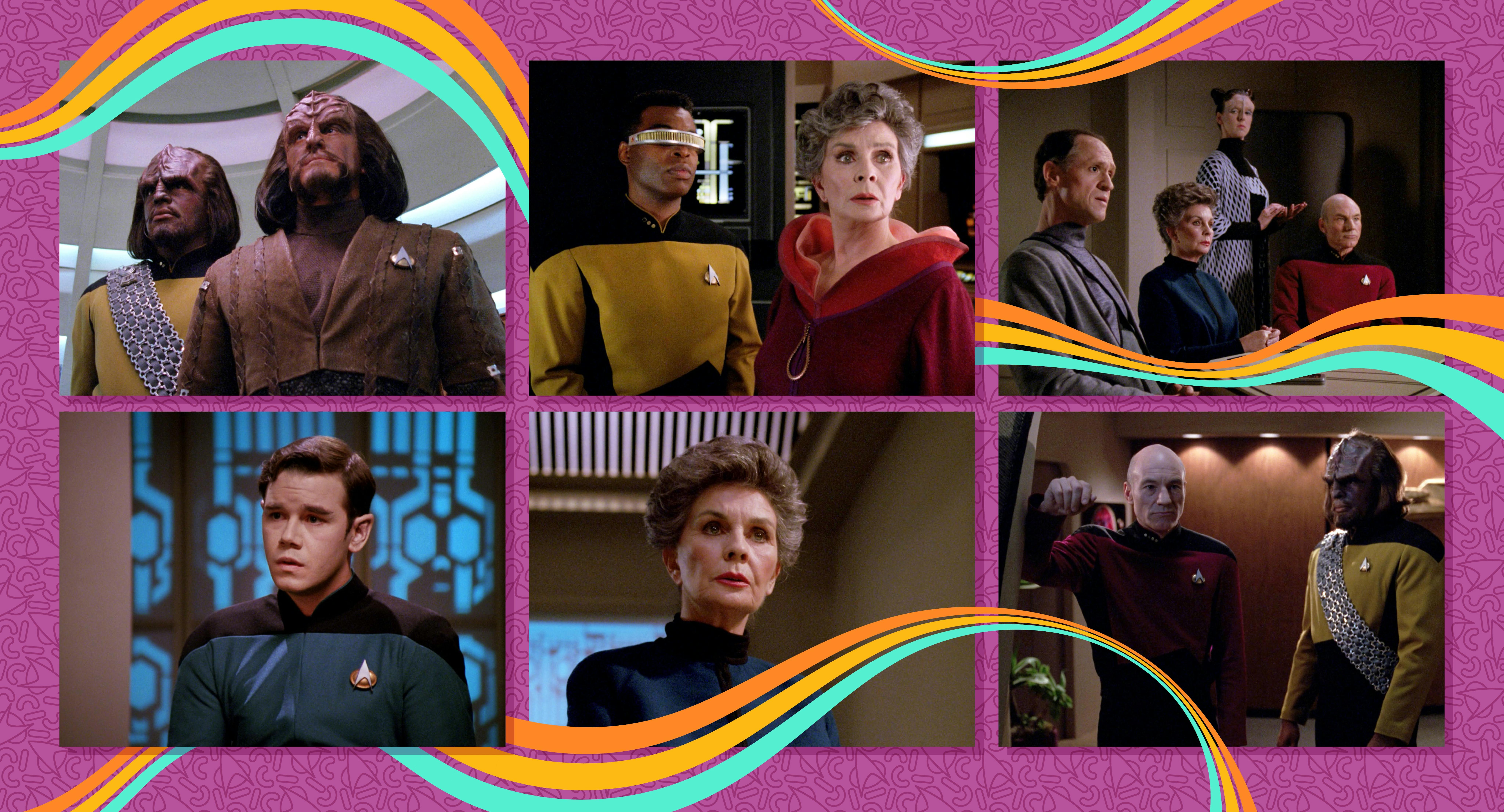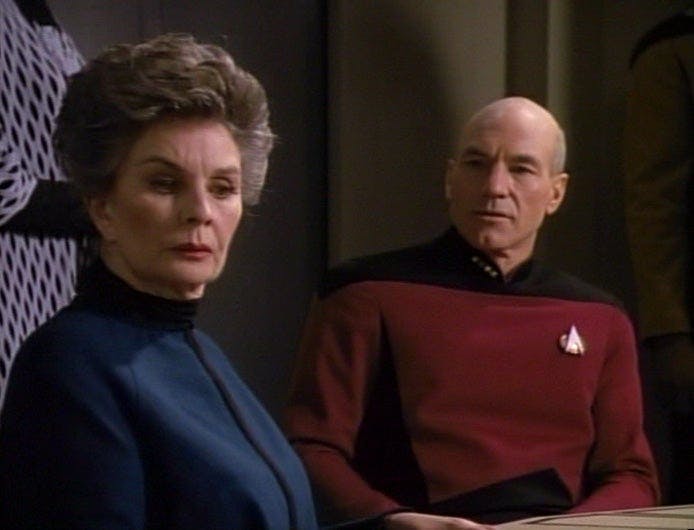Published Sep 30, 2022
How The Next Generation Illustrated the Dangers of Fear
'The Drumhead' teaches us a valuable lesson, now more than ever.

StarTrek.com
In the world today, turning on the news means being exposed to a deluge of fear-mongering. Leaders and politicians will use rumors and fear to drum up anger towards marginalized groups, and their followers will repeat these same statements as fact. This rhetoric is used to justify social and political actions, and it is not right. Of course, we can also draw parallels between our world and the Star Trek universe, even in the supposedly ideal future of the Federation.
The Star Trek: The Next Generation episode “The Drumhead” takes a very close and personal look into the issue of spreading rumors and fear for the sole purpose of establishing the perceived dominance and authority of one individual. What starts as a trial investigating the movements of J’Dan, a Klingon spy, quickly escalates into an inquiry into the lives of all those who had contact with the accused saboteur. The instigator of the ever-widening investigation, Rear Admiral Norah Satie, comes blazing onto the Enterprise after being brought out of retirement. She enters the scene looking for one last note of glory in her career, before she fades into the twilight of old age.?
Almost desperate to extend her time in the limelight of the courtroom, Satie turns to the first loose thread she finds in the court proceedings. Medical Technical Simon Tarses, originally brought into the courtroom as a witness, and later as a suspected accomplice, has his genetic heritage dragged out for public display and inspection. Being a quarter Romulan, a race that's currently an enemy of the United Federation of Planets, makes Simon a threat to the security of the Federation in Satie's eyes.?

StarTrek.com
Satie not only targets Tarses, but also the Enterprise senior staff — Worf and even Captain Picard. Worf's father, Mogh, was posthumously accused of conspiring with the Romulans, events of which led to the Khitomer Massacre. Across several episodes, Worf repeatedly defends his late father's non-involvement in the tragedy. It would later be revealed that records were falsified to implicate Mogh. Satie would then set her sights on Picard for his past Borg associations. The Enterprise captain, once assimilated as Locutus of Borg, struggles to reclaim his humanity after he was recovered from the Borg hive mind. This incident would define parts of Picard's character throughout most of TNG, its subsequent films, as well as current series Star Trek: Picard. On several occasions, he must prove himself as fully human, and no longer in league with the Borg Collective.
For context, drumhead trials are quickly-assembled military trials, carried out in the field of war, for crimes that need to be settled immediately. Historically, these trials have not had the care, time, and consideration to fully investigate the circumstance of the crime in question. This exploited use of “justice” usually leads to a rushed sentence for the accused, leaving no room for appeals. As Picard states in this episode, “Those who came to a drumhead were doomed.”?
Jumping to negative conclusions about marginalized groups has been a long-standing social problem, not simply existing in a far distant past. It continues to be seen in all areas of the globe in the present day. American readers may not know this, but during World War I, Ukrainian Canadians were seen as a potential political threat due to Ukraine’s geographic proximity to Russia. Ukrainian Canadian men were sent to work camps as a result of this fear, my great-grandfather being one of them. This is just an example of the ways that bigotry and fear-mongering have been used, and are still used, to serve a political agenda that further marginalizes people who are deemed to be a threat to whoever is in power.

StarTrek.com
Simon Tarses is a victim of the very act; his presumed guilt due to his Romulan genetic heritage made him a prime target for Satie, who could "see" security threats and treachery in everyone if she looked hard enough. Her ambition to leave as large an imprint on history as her father had led her to search for anything she could misrepresent, in hopes of sowing the seeds of fear and paranoia. Satie did not care about ruining careers and lives if it enabled her to fuel her own influence with a trial that would put her in the annals of judiciary history.
As much as I want to think that the world, as a whole, has advanced past the prejudice and hatred of the mid-20th Century, I see it leaping backwards when news stories speak of some current events. Today, we see the same fear-mongering as we have before that finds familiar and new targets, something which puts us farther away from the idealized future of Starfleet.
At the end of “The Drumhead,” Picard shares with Worf that while the United Federation of Plants prides itself on having come so far to overcome prejudice and speciesism, some will still turn to bigotry and fear if they perceive a threat to the status quo. Even if there is no real threat, figures like Satie often fight tooth and nail to wipe away elements of society that they fear; they will use tactics to turn others against these groups as well.

StarTrek.com
Fear of the unfamiliar is a common human response. We can all be quick to judge, which doesn’t make us inherently bad in and of itself. However, if the behavior fuels bad faith arguments and witch trials, one must consider the impact on the community and whether one represents the ideals of a hopeful and cooperative present/future.
What are ways to help a person be more open-minded? Learn about where the other individual is coming from, listen to their story of lived experiences, and assume positive intent. When we allow ourselves to listen and learn, be it from interacting with others to even being called out for ingrained behavior, we can grow and become better people. If we cling to imposing beliefs that curtails individual rights and freedoms out of fear of the other, or the perceived reduction of one's own privilege or status, then we fall prey to the same fear-mongering that Admiral Satie encouraged. We need to be vigilant of ourselves and of those we choose to follow, or else what happened to Simon Tarses will continue to happen to individuals and groups in our timeline and beyond.
Adeline Panamaroff (she/her) is an otaku article writer who covers scientific fiction, anime and green living topics. She has written for Anime News Network, Anime Harold and Embroidery Canada.
Stay tuned to StarTrek.com for more details! And be sure to follow @StarTrek on Facebook, Twitter, and Instagram.

